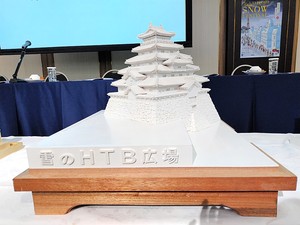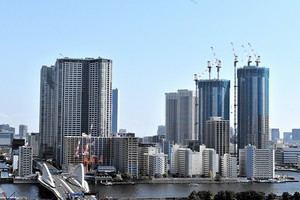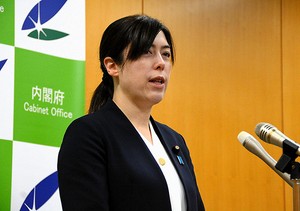By TATSUO OSHIMA/ Staff Writer
July 31, 2024 at 07:00 JST
 Hiroshi Kamiwaki poses on Kobe Gakuin University’s Port Island Campus in the city’s Chuo Ward with his signature bandanna, which he started wearing when he was cramming for university entrance exams. He did not take it off even in court. “An official warned me to take it off, but a judge said, ‘Well, let’s leave it as it is.’” (Toshiki Toyama)
Hiroshi Kamiwaki poses on Kobe Gakuin University’s Port Island Campus in the city’s Chuo Ward with his signature bandanna, which he started wearing when he was cramming for university entrance exams. He did not take it off even in court. “An official warned me to take it off, but a judge said, ‘Well, let’s leave it as it is.’” (Toshiki Toyama)
KOBE—Hiroshi Kamiwaki has worked on his fair share of political scandals, but the scoop he read in the Akahata (red flag) newspaper of the Japanese Communist Party caught him off-guard
The Sunday edition in November 2022 revealed that the very people who created a law were, in fact, violating that law.
Kamiwaki, a constitutional law professor at Kobe Gakuin University, worked tirelessly to examine the political fund reports of lawmakers and factions in the ruling Liberal Democratic Party.
He filed a criminal complaint with the Tokyo District Public Prosecutors Office, prompting the Special Investigation Department to open a probe into the unreported funds.
Once a “delinquent” student, Kamiwaki, 65, is now the leading authority in pursuing political fund scandals.
“I have so far filed more than 100 complaints, although I don’t have an accurate memory,” he said.
He lodged his first complaint in 2000 about state subsidies received by six political parties that were created after the 1997 disintegration of the New Frontier Party (Shinshinto).
In 2001, he filed a complaint about unspecified expenditures of LDP headquarters that were labeled as expenses for organized activities.
In the latest scandal, he filed a complaint about the fund-raising parties held by Kentaro Sonoura, a former Lower House member of the LDP.
Prosecutors contacted the professor, saying, “You know, you have lodged yet another complaint.”
“They had never contacted me at other times,” Kamiwaki said. “Perhaps they wanted to tell me that once Sonoura’s case was over, they were going to work on the fund-raising parties of LDP factions that I had also filed a complaint about.”
The failure of factions and lawmakers to properly report these funds appeared to be a systemic operation. But much of the blame fell on those in charge of accounting.
LDP factions have decided to dissolve themselves to settle the matter, but how the funds were spent remains unclear.
A native of Kagoshima Prefecture, Kamiwaki said he was a “delinquent” student. He spent three years cramming for university entrance exams after finishing high school.
When he was finally admitted to a university, he neglected his studies and indulged in drinking and playing mah-jongg.
Although he had entered a faculty of law, he became hooked on philosophy classes.
The professor in charge of the classes was a scholar of Jean-Paul Sartre, who advocated “engagement” (social commitment).
Kamiwaki said the professor often took him to a noodle restaurant, where they discussed philosophy over drinks.
Law, by contrast, was a tough subject for him.
When he read technical books on law, he would contemplate which theory was reasonable and why it was reasonable.
“Somebody who thinks so much as you do could never pass the national bar exam,” Kamiwaki quoted a friend as telling him. “What about becoming a scholar?”
Kamiwaki spent two more years cramming for entrance exams before he was admitted to a graduate school, where he studied the Constitution of West Germany.
Kamiwaki worked with legal experts and researchers to set up Seiji Shikin Ombudsman (Political funds ombudsman), a civil advocacy group, and the Center for Money and Politics, a public interest incorporated foundation that publishes lawmakers’ political fund reports online.
He has filed criminal complaints over dinner receptions hosted by former Prime Minister Shinzo Abe for his supporters on the eve of taxpayer-funded cherry blossom viewing parties.
Another complaint concerned the dubious sale of state-owned land to the Moritomo Gakuen educational institution, which had ties to Abe’s wife, Akie.
“The Constitution is a law for applying the brakes on public authority,” Kamiwaki said. “It is therefore by no means unnatural for a researcher of constitutional law to campaign against runaway behavior of the government, Cabinet ministers and lawmakers.”
Kamiwaki doesn’t like being called a “scholar” and insists on the title “researcher.”
“I have yet to study more,” he said, humbly. “There are things that I cannot make out, even when I try to look them up.”
In a recent interview with The Asahi Shimbun, Kamiwaki shared accounts of his life, his activities and his beliefs.
Excerpts of the interview follow:
***
Question: It all started with the Akahata newspaper, right?
Kamiwaki: Yes. The editorial staff approached me and asked me for a comment. When I was told about the story, I thought, “Oh, this is so serious.”
Most of the complaints I have filed have origins in stories carried by newspapers and weekly magazines. I get to know about a scandal when I am approached and asked for a comment. I then look up public information and other documents and materials to re-examine the matter and work out a written complaint.
The news media are thus playing an important role.
Q: You said you gave up your New Year’s holidays last year to work out a written complaint. Could you elaborate?
A: I had to look up every single political fund report of the political groups representing five LDP factions to check incomes and expenditures, so it was quite a lot of work.
I had to give up my New Year’s holidays this year again, because I learned the LDP’s Tokyo chapter (chaired by Koichi Hagiuda) had also failed to list accounts of income from political fund-raising parties, just like the LDP factions had done.
Q: Examining political fund reports is a complicated process, right?
A: Yes. You have to begin with finding out what political groups and political party chapters are held by such a politician.
Some of the groups and chapters are headed by the politician in question. In other cases, the politician is the de facto head without being listed as such.
And some groups and chapters report to the internal affairs minister, whereas others report to prefectural election administration commissions. You have to look that all up.
Most of the election administration commissions publish political fund reports online, but others only disclose the reports upon a freedom-of-information request.
The official position is that the public has the means to keep watch on political funds. In reality, however, doing so could never be called easy. And the reports are preserved and disclosed only for three years.
Q: Did you expect the latest scandal to grow so big?
A: The latest case is not about fund-raising parties held by individual politicians. It was about major LDP factions using mutually similar tricks to evade listing their funds over a long period of time.
That’s so vicious. I thought that prosecutors would take action because I had told them that slush funds were very likely being amassed.
Q: What do you think of the prosecutors’ investigation?
A: I kept a careful watch to see if the prosecutors would lock horns in earnest with the LDP. As it turned out, unfortunately, I got the impression that they closed the case just by having minor officials carry the can.
Those in charge of accounting couldn’t have allowed slush funds to be amassed at their own discretion. Senior faction officials must have taken the lead in that setup. Leaving the latter unprosecuted is allowing a great evil to sleep soundly.
I have already lodged complaints about the slush funds pooled by the Motegi and Kishida factions, and about the slush funds pooled and the kickbacks paid within the Nikai faction.
I plan to do the same about the slush funds and kickbacks within the Abe faction. I will be filing successive complaints against a large number of lawmakers.
Q: You said you were a young lover of philosophy. Could you elaborate?
A: When I was a high school graduate cramming for university entrance exams, I had an opportunity to read “Ikiru Imi” (Meaning of life), a book by author Rinzo Shiina (1911-1973). I had been asked to write a report on the book on behalf of a friend.
I get easily hooked whenever I take an interest in something, so I began reading Shiina’s books extensively, which led me to read books on Christianity and Marxism. Looking back now, I think that was the time I first took interest in philosophy.
Q: So why did you become a researcher of constitutional law instead?
A: I did find it fun to study the philosophy of law. I developed a stronger desire to study the theory of justice, but this discipline is so abstract in nature. I had only read books on it, and I wasn’t sure if I really understood it.
When I asked a professor for advice on that, the response was, “What about setting your sights on how justice is realized in legal interpretations?” I then changed my course to constitutional law.
As a graduate student, I studied the political party system, electoral system and political fund system of West Germany.
Q: You have been advocating the establishment of parliamentary democracy. Could you elaborate?
A: The number of seats obtained is not proportional to the number of votes obtained under the current electoral system (for the Diet), which was introduced as part of the “political reform” of 1994.
During the latest Lower House election (in 2021), the LDP won an absolute stable majority (both the chairs and the majority of members in all standing committees) with less than 50 percent of all votes in the single-seat constituencies and less than 40 percent of all votes in the proportional representation constituencies.
That means we have the worst electoral system that gives a big political party more seats than it deserves for the number of votes it has won. And it gives small and midsize political parties fewer seats than they deserve.
The popular will is distorted in the Diet’s composition.
This is no parliamentary democracy. This is why those in power have had their own way so easily. We should introduce a complete proportional representation system that also allows independents to run.
In terms of the “absolute percentage of votes,” or the proportion among all eligible voters, including those who didn’t vote, LDP candidates won less than 30 percent of all votes in the single-seat constituencies and less than 20 percent of all votes in the proportional representation constituencies.
Q: Some blame eligible voters who don’t vote. What is your take on that?
A: First of all, that’s a problem of the system. Under the current electoral system, people resign themselves to the idea that voting won’t change anything. It’s too cruel to put the blame on the eligible voters.
The voter turnout rate would rise under a complete proportional representation system, which would facilitate changes of government. The problem could then be attributed to eligible voters only if they still didn’t vote.
Q: Do you plan to continue lodging complaints in the years to come?
A: I am an old man now. I have had a problem with my large intestine for the past three years, and I have been hospitalized many times for emergency treatment. My left eyesight has also fallen because of a disease, so it’s hard work just to read documents and materials.
My colleagues are also retiring. I would say, though, that I hope to stick it out while I can still afford to do so.
Q: This is my last question. Do you continue to drink?
A: I drink non-alcoholic beer alone when I am at home. I have decided to do without drinking because, whenever I have a drink, my wife asks me with a worried look, “Are you OK?”
I don’t lock horns over something like that (ha ha).
***
Hiroshi Kamiwaki was born in Kagoshima Prefecture in 1958. His family moved frequently because his father, who worked for a power utility, was often transferred. He began living with his maternal grandmother from junior high school age so he didn’t have to change schools before graduation.
After completing Kagoshima Prefectural Kajiki High School, Kamiwaki spent three years cramming for university entrance exams before he was admitted to Kansai University’s Faculty of Law.
He spent two more years cramming for exams before entering Kobe University’s graduate school.
Kamiwaki worked for Kita-Kyushu University (now the University of Kita-Kyushu) from 1994. He became a professor with the Kobe Gakuin University Graduate School of Law Practices in 2004 and has been a professor with the university’s Faculty of Law since 2015.
In 2000, Kamiwaki was one of 17 individuals who jointly lodged a written complaint with the Tokyo District Public Prosecutors Office, arguing that six political parties from the splintered New Frontier Party had illegally received political party subsidies from the government.
He continued filing complaints about political fund scandals at the urging of Tokuo Sakaguchi, an Osaka-based lawyer.
Kamiwaki’s most recent book is titled: “The reason I keep filing complaints about political fund scandals” (in Japanese).
He has published many booklets for general readers, including “Should the political party subsidy system still be maintained?” (in Japanese).
Kamiwaki has a wife of the same age, and they have a son.




















A peek through the music industry’s curtain at the producers who harnessed social media to help their idols go global.
A series based on diplomatic documents declassified by Japan’s Foreign Ministry
Here is a collection of first-hand accounts by “hibakusha” atomic bomb survivors.
Cooking experts, chefs and others involved in the field of food introduce their special recipes intertwined with their paths in life.
A series about Japanese-Americans and their memories of World War II